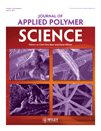Aerobic oxidative polymerization of 2,6-dimethylphenol in water with a highly efficient copper(II)– poly(N-vinylimidazole) complex catalyst
Abstract
A Cu(II)–poly(N-vinylimidazole) (PVI) complex was prepared and used to catalyze the oxidative polymerization of 2,6-dimethylphenol (DMP) to form poly(2,6-dimethyl-1,4-phenylene oxide) (PPO) in water. The stoichiometric ratio between imidazole groups in PVI and copper ions was found to be 4 when continuous variation analysis was applied. Compared with a conventional Cu(II)–low-molecular-weight ligand complex, a high catalytic efficiency was observed in the polymerization of DMP catalyzed by the Cu(II)–PVI complex. The influence of the Cu(II)–PVI complex concentration and imidazole/Cu(II) molar ratio on the oxidative polymerization of DMP was studied. Both the yield and molecular weight of PPO increased significantly with the catalyst concentration and decreased with the imidazole/Cu(II) molar ratio. The molecular weight of PVI also played an important role in the improvement of the catalytic efficiency. The high catalytic efficiency of the Cu(II)–PVI complex may have been due to the concentration effect of the catalyst and substrate. © 2010 Wiley Periodicals, Inc. J Appl Polym Sci, 2011




